Update 8
(14/06/21)
In the treated area of tomatoes we’ve noted minimal heliothis eggs, minimal larvae; low silverleaf whitefly adults, very low eggs and young nymphs; minimal thrips activity in flowers and minimal damage to fruit; very low numbers of winged aphids; initial two-spotted mite and broad mite.
There’s also very low Alternaria and Stemphyllium lesions on foliage; and initial powdery mildew on lower leaves.
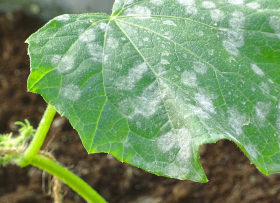
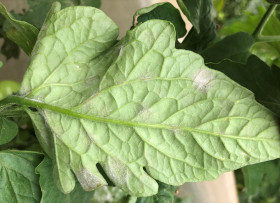
As for the treated area of rockmelons, there’s very low fresh heliothis eggs; nil larvae but cucumber moth adults are very active; very low silverleaf whitefly adults, very low eggs and nymphs visible; reduced tomato thrips activity in flowers; minimal winged aphids; very low old 28-spotted ladybird feeding damage to leaves; finally there’s minimal evidence of powdery mildew or downy mildew.
Click here to view the spray propgram applied to date.
Update 7
(07/06/21)
We’ve only got 2 weeks left to GrowMore
Our crops look amazing. The tomatoes have 6 to 7 trusses and the rockmelons are rapidly expanding.
All the hard work is definitely starting to pay off. With harvest approaching, we have to remain vigilant as what we do in the closing weeks can have a massive impact on fruit quality.
INSECT ACTIVITY
Our insecticide spray program has, in recent weeks, been extremely effective. Right now we feel like we have the upper hand, so much so, we are not going to apply an insecticide this week.
Regular monitoring is a must, understanding the crop stage, the local climate, the biology of the pest and the impact of beneficials are just some of the variables that can influence a spray decision. Economic thresholds based on experience will ensure you are able to maximise the return on your investment.
DISEASE INCIDENCE
The results from our fungicide program have, to date, been amazing. If you get the chance to look through the untreated plots at GrowMore you will be quickly reminded how important an effective preventative spray program is.
In our untreated tomato crop there is some Alternaria lesions on the foliage, we’ve also got some powdery mildew on the lower leaves. The untreated rockmelons are also showing signs of an early powdery mildew infection, particularly on the crown leaves. The wind has recently dropped, and there has been a couple of days where we have had a heavy dew and a solid fog. These conditions have been ideal for disease development.
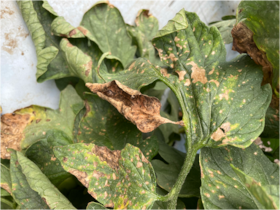
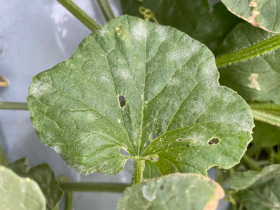
At this year’s GrowMore site, we’ll explain the rationale behind our preventative spray program, with a focus on our pipeline fungicide. This brand new fungicide is set to become an industry standard.
Click here to view the spray propgram applied to date.
Update 6
(31/05/21)
Wow, do they grow!
With great weather and a targeted spray program for insect pests and disease, the crops at Bowen GrowMore are flourishing.
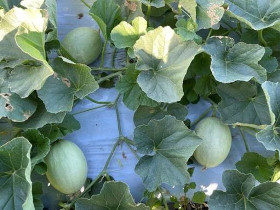
INSECT ACTIVITY
The untreated area gives us an idea of the natural insect pressure. Young tomatoes have some thrips feeding damage (see below), with silverleaf whitefly and mite populations increasing also. In our treated area, Syngenta’s insecticides have reduced insect numbers but it’s time to apply our new exciting Pipeline Insecticide so the crops can reach their full potential.
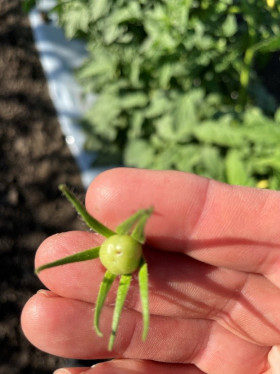
DISEASE INCIDENCE
It’s an exciting time to show Syngenta’s new pipeline fungicide. This has the power of two actives to control broad spectrum diseases across multiple crops. Bowen GrowMore gives us a first look at the next blockbuster solution!
With a strong preventative fungicide program and ideal growing conditions, disease pressure remains low. But powdery mildew is one disease that loves rockmelon and tomato so watch this space!
Click here to view the spray propgram applied to date.
Update 5
(24/05/21)
I see it, but I don't believe it!
What you don’t know is we have another block at the GrowMore site, one we have been keeping under wraps.
This week we applied a new pipeline insecticide that is set to be a game changer. We had an independent assessment conducted and it exceeded our expectations.

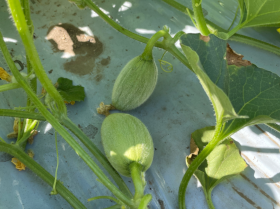
INSECT ACTIVITY
This week we found some newly laid Helicoverpa and cluster caterpillar eggs on the tomatoes and lots of very active cucumber moths in the rockmelons.
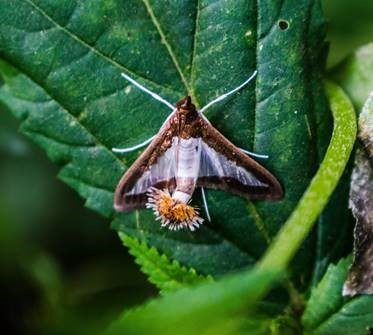
Following last week’s application of MINECTO FORTE there are now only very low numbers of silverleaf whitefly and there is reduced thrips and aphid activity.
DISEASE INCIDENCE
There are no disease symptoms evident in the treated tomatoes and rockmelons, our fungicide program is working a treat. There are some diseases starting to develop in the untreated crop, more on this in the coming weeks.
Click here to view the spray propgram applied to date.
Update 4
(17/05/21)
At GrowMore, the sky's the limit!
This week, we put a drone up over GrowMore, it shows the size of the site and gives you a sense of what’s going on in the paddock.
Watch the video below to see some of the insect pests in high definition.
Click here to view the spray propgram applied to date.
Update 3
(10/05/21)
We GrowMore so you KnowMore…
It’s true, our GrowMore site has been designed to showcase our new product pipeline applied with an air-assisted boom, so participants can see them used in a commercial spray program.
If you’re visiting this year’s GrowMore site in Bowen, we guarantee you’ll leave knowing more!
Nematode management needs to commence well before transplanting. Now that the crops are established, let’s reflect on what’s happening below the ground. If crops are going to reach their potential you’ll need strong, healthy roots. Whatever you do, don’t let nematodes UNDO all your hard work.
Syngenta has a new nematicide in the pipeline and our Horticulture Team will be in the paddock to give participants a close look at root-knot nematodes and discuss how to manage them effectively.

Schematic diagram of a root-knot nematode moving through the soil
The tomatoes and rockmelons have grown phenomenally. From a crop protection perspective, this means there is a lot of new growth that wasn’t there at last week’s spray. Now is definitely not the time to relax.
INSECT ACTIVITY
This week there are a very low number of scattered Helicoverpa eggs on the tomatoes, and on the rockmelons there are very low numbers of cucumber moth larvae.
With a large high pressure system influencing the weather at the moment, silverleaf whitefly activity is expected to increase. They are not good fliers, and the calm winds allow them to easily move from crop to crop. There are already some eggs in the paddock and when they hatch the nymphs will move throughout the canopy and start feeding.
DISEASE INCIDENCE
There are no disease symptoms evident in the tomatoes and rockmelons.
Click here to view the spray propgram applied to date.
Update 2
(03/05/21)
We’re off and racing at GrowMore…
This year we’ve planted rockmelons and tomatoes, and it’s fair to say growing conditions in north Queensland are just about perfect right now!
The rockmelons are already at the 4 to 5 leaf stage, flower buds are developing in the tomatoes and yes the stakes are in the ground, ready for the first wire to go up.


INSECT ACTIVITY
There are some Helicoverpa (Heliothis) eggs on the tomatoes, a few cucumber moth larvae in the rockmelons, plus very low numbers of adult silverleaf whitefly (nil nymphs) in both crops.
NB: Insecticide applications will be based on insect pest thresholds.
DISEASE INCIDENCE
There is minimal damping off in the tomatoes and there is nil disease in the rockmelons.
NB: Diseases will be managed with a preventative fungicide spray program every 7 - 10 days.
Click here to view the spray propgram applied to date.
Update 1
(26/04/21)
Syngenta’s GrowMore site has just been transplanted in Bowen, Queensland…
At our GrowMore sites we have a commercial look at our new horticulture product innovations.
We are showcasing our pipeline: A unique broad spectrum fungicide, a new mode of action insecticide and a nematicide that does much more than you might think!
Contact your local Syngenta Territory Sales Manager to find out how you can attend this COVID safe event in June.
If you can’t make it to the field, make sure you register for the live cross for all the highlights. Standby for an update!
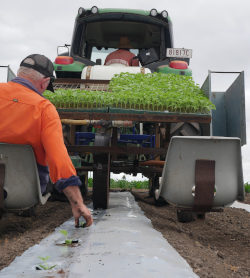

Hands on activities will include:
- What impact insecticides can have on key beneficial insects
- A close look at nematodes and their galls to decide if control was required
- Disease identification and developing best in class preventative fungicide spray programs
Proudly brought to you by
Syngenta's Horticulture Team